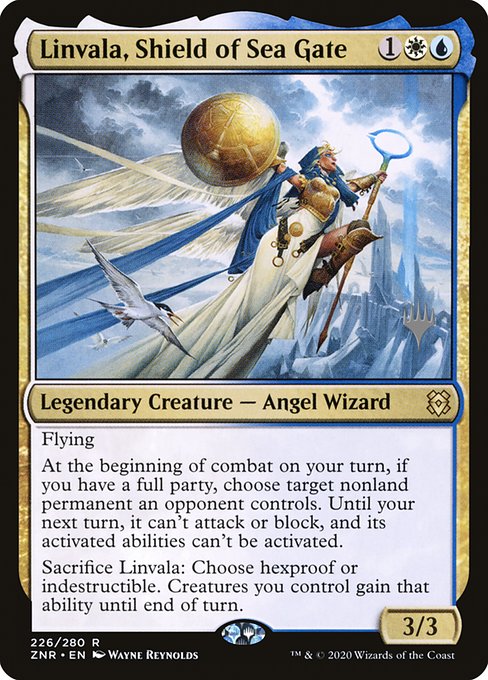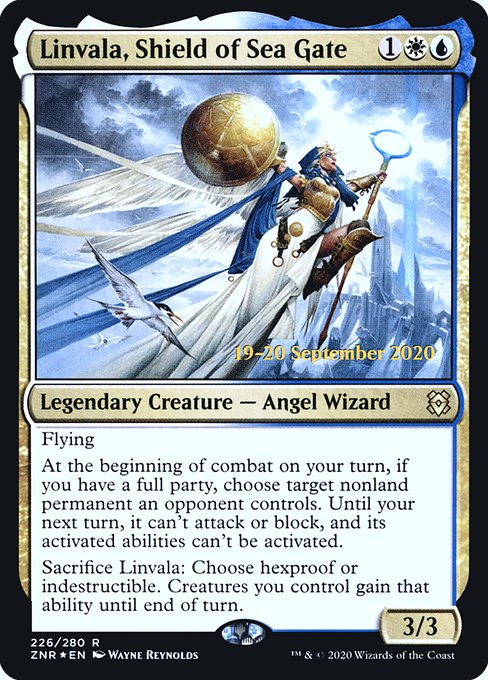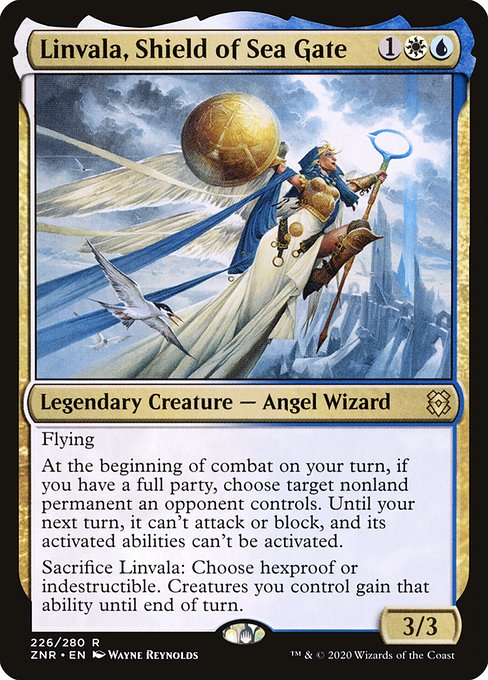Linvala, bouclier de Porte des Mers
Créature légendaire : ange et sorcier
Vol
Au début du combat pendant votre tour, si vous avez un groupe complet, choisissez un permanent non-terrain ciblé qu'un adversaire contrôle. Jusqu'à votre prochain tour, il ne peut ni attaquer ni bloquer et ses capacités activées ne peuvent pas être activées.
Sacrifiez Linvala : Choisissez la défense talismanique ou l'indestructible. Les créatures que vous contrôlez acquièrent cette capacité jusqu'à la fin du tour.
Au début du combat pendant votre tour, si vous avez un groupe complet, choisissez un permanent non-terrain ciblé qu'un adversaire contrôle. Jusqu'à votre prochain tour, il ne peut ni attaquer ni bloquer et ses capacités activées ne peuvent pas être activées.
Sacrifiez Linvala : Choisissez la défense talismanique ou l'indestructible. Les créatures que vous contrôlez acquièrent cette capacité jusqu'à la fin du tour.
3/3
standard
future
historic
gladiator
pioneer
explorer
modern
legacy
pauper
vintage
penny
commander
brawl
alchemy
paupercommander
duel
oldschool
premodern
Rulings
If a creature has more than one party creature type, and there are multiple ways to count that creature that could result in a different number of creatures in your party, the highest such number is used. For example, if you control a Cleric and a Cleric Wizard, the number of creatures in your party is two. You can’t choose to have it be just one by counting the Cleric Wizard first as a Cleric.
An ability referring to the number of creatures in your party gets a number from zero to four. Such abilities never ask which creatures are in your party, and you never have to designate specific creatures as being in your party. You can’t choose to exclude creatures from this count to lower the number.
Activated abilities contain a colon. They’re generally written “[Cost]: [Effect].” Some keyword abilities (such as equip) are activated abilities and will have a colon in their reminder text. Triggered abilities (starting with “when,” “whenever,” or “at”) are unaffected.
To determine “the number of creatures in your party,” check whether you control a Cleric, whether you control a Rogue, whether you control a Warrior, and whether you control a Wizard. The number is the total number of those checks to which you answered yes. Each creature you control can be counted for only one of those checks.
In a multiplayer game, if you leave the game after Linvala’s middle ability resolves but before your next turn begins, its effect lasts until your next turn would have begun. It neither expires immediately nor lasts indefinitely.
The nonland permanent remains affected until your next turn even if the number of creatures in your party changes or Linvala leaves the battlefield.
No abilities of the affected permanent can be activated, including mana abilities.
Linvala’s middle ability won’t trigger at all if you don’t have a full party as your combat phase begins. It won’t affect the target if you don’t have a full party as it resolves. The number of creatures in your party may change between these times, however.
Some cards refer to you having a “full party.” This is true if the number of creatures in your party is four.
An ability referring to the number of creatures in your party gets a number from zero to four. Such abilities never ask which creatures are in your party, and you never have to designate specific creatures as being in your party. You can’t choose to exclude creatures from this count to lower the number.
Activated abilities contain a colon. They’re generally written “[Cost]: [Effect].” Some keyword abilities (such as equip) are activated abilities and will have a colon in their reminder text. Triggered abilities (starting with “when,” “whenever,” or “at”) are unaffected.
To determine “the number of creatures in your party,” check whether you control a Cleric, whether you control a Rogue, whether you control a Warrior, and whether you control a Wizard. The number is the total number of those checks to which you answered yes. Each creature you control can be counted for only one of those checks.
In a multiplayer game, if you leave the game after Linvala’s middle ability resolves but before your next turn begins, its effect lasts until your next turn would have begun. It neither expires immediately nor lasts indefinitely.
The nonland permanent remains affected until your next turn even if the number of creatures in your party changes or Linvala leaves the battlefield.
No abilities of the affected permanent can be activated, including mana abilities.
Linvala’s middle ability won’t trigger at all if you don’t have a full party as your combat phase begins. It won’t affect the target if you don’t have a full party as it resolves. The number of creatures in your party may change between these times, however.
Some cards refer to you having a “full party.” This is true if the number of creatures in your party is four.
Rulings
If a creature has more than one party creature type, and there are multiple ways to count that creature that could result in a different number of creatures in your party, the highest such number is used. For example, if you control a Cleric and a Cleric Wizard, the number of creatures in your party is two. You can’t choose to have it be just one by counting the Cleric Wizard first as a Cleric.
An ability referring to the number of creatures in your party gets a number from zero to four. Such abilities never ask which creatures are in your party, and you never have to designate specific creatures as being in your party. You can’t choose to exclude creatures from this count to lower the number.
Activated abilities contain a colon. They’re generally written “[Cost]: [Effect].” Some keyword abilities (such as equip) are activated abilities and will have a colon in their reminder text. Triggered abilities (starting with “when,” “whenever,” or “at”) are unaffected.
To determine “the number of creatures in your party,” check whether you control a Cleric, whether you control a Rogue, whether you control a Warrior, and whether you control a Wizard. The number is the total number of those checks to which you answered yes. Each creature you control can be counted for only one of those checks.
In a multiplayer game, if you leave the game after Linvala’s middle ability resolves but before your next turn begins, its effect lasts until your next turn would have begun. It neither expires immediately nor lasts indefinitely.
The nonland permanent remains affected until your next turn even if the number of creatures in your party changes or Linvala leaves the battlefield.
No abilities of the affected permanent can be activated, including mana abilities.
Linvala’s middle ability won’t trigger at all if you don’t have a full party as your combat phase begins. It won’t affect the target if you don’t have a full party as it resolves. The number of creatures in your party may change between these times, however.
Some cards refer to you having a “full party.” This is true if the number of creatures in your party is four.
An ability referring to the number of creatures in your party gets a number from zero to four. Such abilities never ask which creatures are in your party, and you never have to designate specific creatures as being in your party. You can’t choose to exclude creatures from this count to lower the number.
Activated abilities contain a colon. They’re generally written “[Cost]: [Effect].” Some keyword abilities (such as equip) are activated abilities and will have a colon in their reminder text. Triggered abilities (starting with “when,” “whenever,” or “at”) are unaffected.
To determine “the number of creatures in your party,” check whether you control a Cleric, whether you control a Rogue, whether you control a Warrior, and whether you control a Wizard. The number is the total number of those checks to which you answered yes. Each creature you control can be counted for only one of those checks.
In a multiplayer game, if you leave the game after Linvala’s middle ability resolves but before your next turn begins, its effect lasts until your next turn would have begun. It neither expires immediately nor lasts indefinitely.
The nonland permanent remains affected until your next turn even if the number of creatures in your party changes or Linvala leaves the battlefield.
No abilities of the affected permanent can be activated, including mana abilities.
Linvala’s middle ability won’t trigger at all if you don’t have a full party as your combat phase begins. It won’t affect the target if you don’t have a full party as it resolves. The number of creatures in your party may change between these times, however.
Some cards refer to you having a “full party.” This is true if the number of creatures in your party is four.
Votre collection ? vos decks ?
Envie de gérer votre collection et/ou créer des decks ?
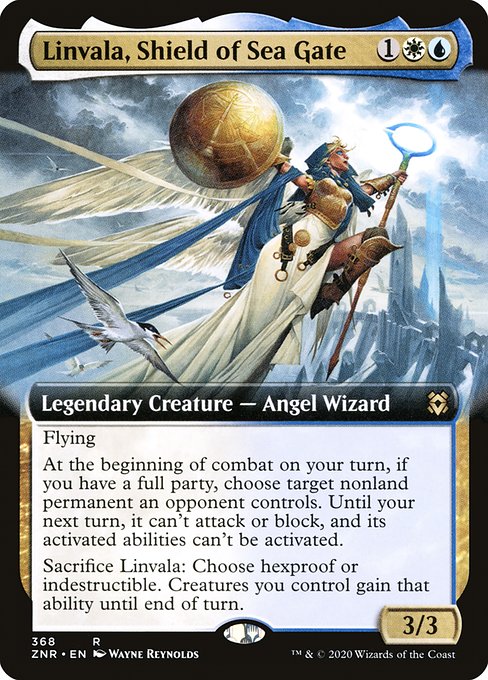

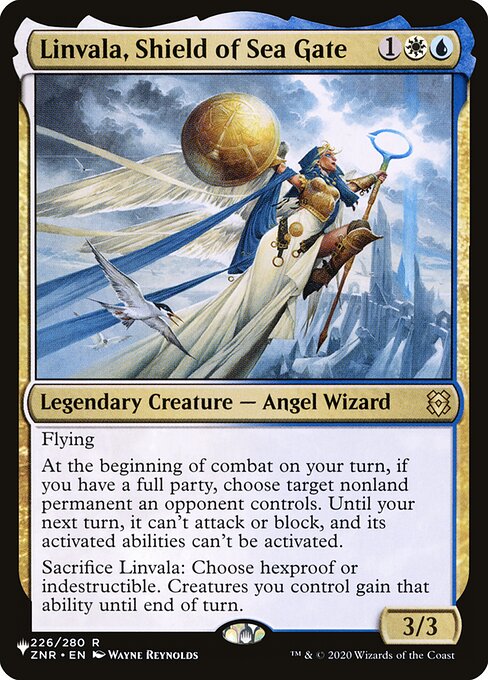
 0
0
 0.17€
0.17€
